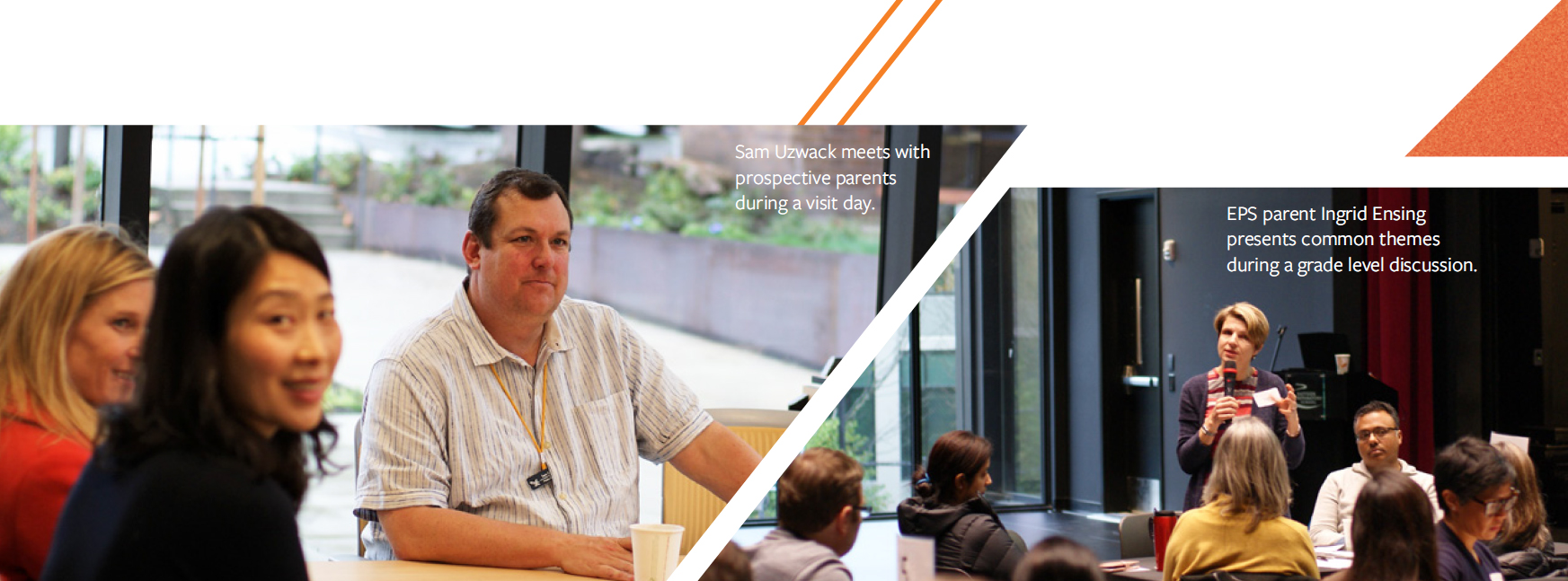
Creating Community With Intent
By Sam Uzwack, Middle School Head
“Remember that children, marriages, and flower gardens reflect the kind of care they get.”
– H. Jackson Brown, Jr.
(author of Life’s Little Instruction Book)
I HAVE OFTEN THOUGHT ABOUT SCHOOL cultures as gardens. If you neglect your garden, it is soon overtaken by the surrounding flora. Based on my past meager gardening efforts, I have come to find that this can happen surprisingly fast. Once the garden is established, however, then that constant maintenance preserves what you have originally envisioned.
Because independent schools are mission-driven, and in the case of Eastside Prep, driven to inspire students to create a better world, a culture must be established that teaches students what this looks like and how they can participate. Certain values are emphasized and directly taught. And as Middle School Head, it is my job to make sure we have a robust, intentional, and carefully articulated program that brings students into our school to not only teach them how things work, but why things work the way they do.
This is something I think we do very well, but about three years ago, Karen Mills and Anthony Colello, our Sixth and Fifth Grade Level Coordinators, respectively, approached me about something they were noticing. After a couple years overseeing the grade-level experiences for their students, they were surprised by the number of emails, phone calls, and meetings that involved parents wanting clarification about why we handled something a certain way (say, for instance, a tense moment between students). After all, we had taught the students how it all worked!
And then it dawned on them—we were missing a step. We were focusing on getting students and parents ready for the start of the year together, through conferences, class picnics, and new student orientations, but once the school year began, we had only focused on enculturating the students. And thus, our Parent Series was born.
Mills and Colello set to work to create what would become a three-night series of experiences that broke school down into three domains: Academics, Technology, and Student Life/Social Emotional Learning. During these evenings, we would teach parents what we are teaching the students in these domains, and also give some examples of how to work with their students in a manner that would reinforce the culture. And each of these domains was centered on three key principles in the Middle School:

Parents discuss academics, technology and social-emotional learning during a grade level coffee.
We are student-centered.
- We meet students where they are.
- The destination is the same, but the paths may be different.
We create a challenge culture.
- We offer a thinking curriculum.
- We provide stretch and support.
We teach self-advocacy.
- We empower students to understand themselves better as learners.
- We guide students to take more and more charge of their own education.
The Fifth/Sixth Parent Series was then divided into three nights, one each for Academics, Technology, and Student Life. Volunteers from our faculty and staff helped to facilitate each evening, thus allowing for the whole of the teaching team to be engaged with parents.
Just as important as the specific details of our approach to education, the meetings also served to model and reinforce a number of key EPS tenets:
Partnership: Schools need parents and parents need schools. If we can roll up our sleeves and work together on behalf of the students, it is amazing what problems we can solve.
Trust: It takes a lot of trust to send your students to any particular school. It was our feeling that by involving as many faculty and staff as possible with the evening meetings, parents would get to know their students’ teachers more quickly, and in a proactive way, rather than waiting for a concern to arise.
Transparency: If we can equip parents with the same vocabulary and approach to school, then what we are teaching during the day can be reinforced at home. And by hearing parents’ deepest concerns and understanding what they find most challenging about EPS, we can tailor our approach to the families we are serving.
With the successful launch of the Fifth/Sixth Parent Series, the question became, where do we go from here? This year, we added two new programs: the first, a Seventh/Eighth Parent Night (developed by Mike Anderson, Eighth Grade Level Coordinator and Lurline Sweet, Seventh Grade Level Coordinator) asking the question, “So, how is it different from fifth and sixth grade?”
The second piece of new programming was a Ninth Grade Parent Meeting (coordinated by Nickie Wallace, Ninth Grade Level Coordinator). That evening presentation focused on three key points:
- Transition from Middle School
- Starting the journey through Upper School
- Creating a partnership in the process
In addition, the three-topic format of the Parent Series helped us revamp our Grade-Level Parent Coffees as well. Starting in the winter, the format of our Middle School Parent Coffees was revised to divide parents into smaller groups (with both a parent and faculty facilitator at each table) and the topics of academics, technology, and social emotional learning were used as subjects of conversation. The last moments of the meeting were then used to share out common themes.
While the care and maintenance of our school culture is an ongoing process, the addition of these programs has had a wonderful impact on our work with parents. By using a common language and understanding of the philosophical underpinnings of our approach to working with students, a trust is built that allows us to better partner with parents. Maintaining a culture, like gardening, requires intentionality, dedication, and careful planning, but in the end, the results are all the more stunning.

